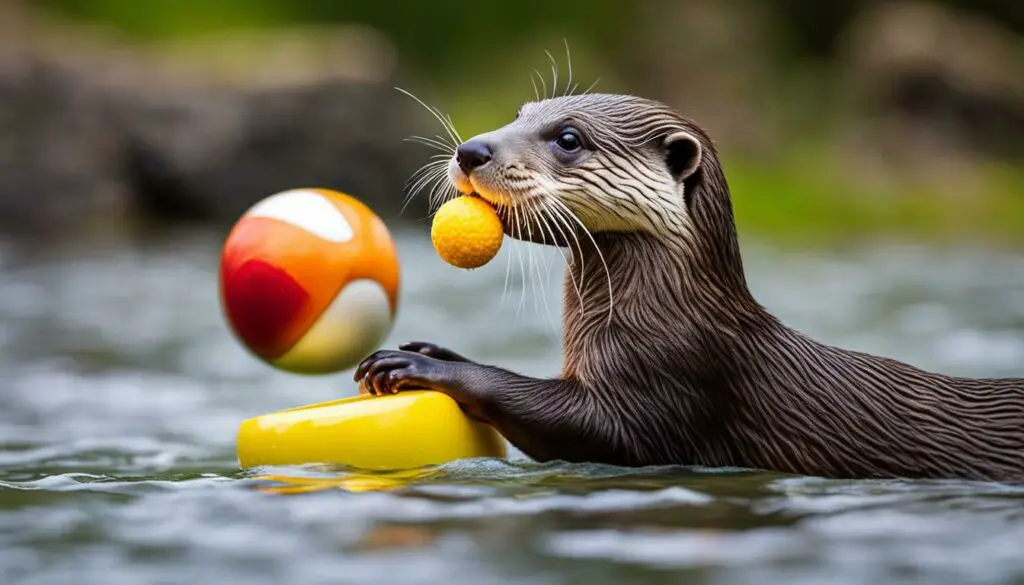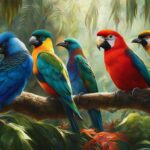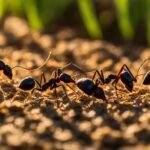Welcome to the world of otters as pets! In this guide, we will explore the joys and challenges of having otters as pets, focusing on the United States.
Key Takeaways:
- Otters are wild animals and not suitable for domestication
- They have specific habitat and dietary requirements
- Keeping otters as pets can be illegal in many countries
- They have a strong odor and can be aggressive
- Supporting conservation efforts and visiting sanctuaries are alternative ways to experience otters
Why Otters Are Not Suitable for Domestication
While otters may seem like adorable companions, there are several reasons why they are not suitable for domestication as pets. Otters are wild animals with specific habitat and dietary requirements, making it challenging to provide them with a suitable living environment.
“Otters require a lot of space and enrichment to thrive. They are highly social animals that need constant mental and physical stimulation,” explains Dr. Emily Wilson, a wildlife expert. “Keeping otters in captivity often leads to boredom and frustration, which can result in destructive behavior.”
In addition to their need for space and social interaction, otters have specialized dietary needs. They have a carnivorous diet, primarily consisting of fish, which can be expensive and difficult to maintain. “A balanced diet is crucial for their health and well-being. Providing the appropriate food and nutritional supplements can be a complex task,” advises Dr. Wilson.
Furthermore, otters can be prone to infections and diseases, which can be challenging to manage in a domestic setting. They have specific hygiene requirements and may carry parasites that can be harmful to humans. Regular veterinary care is essential to monitor their health and prevent the spread of diseases,” says Dr. Wilson.
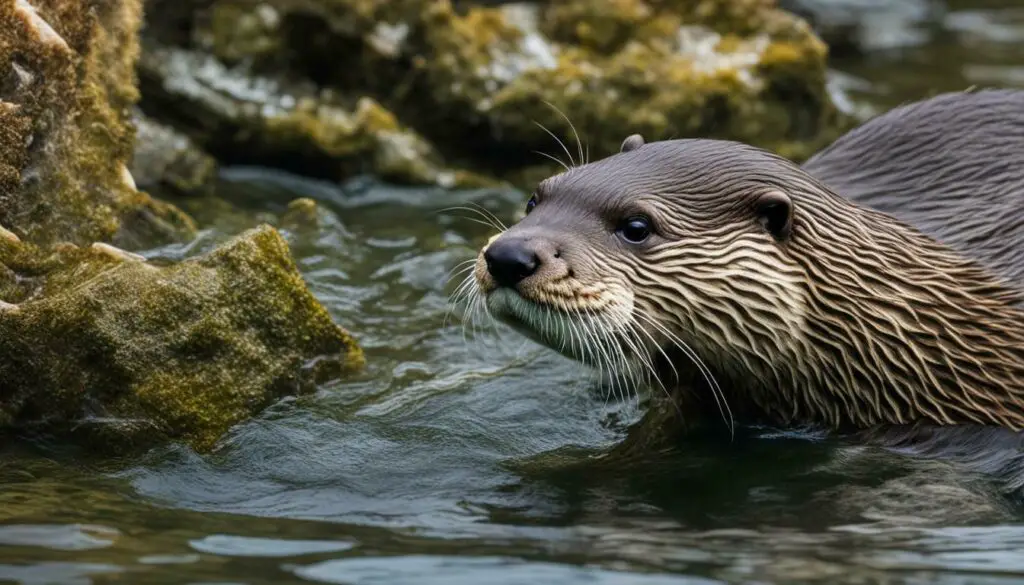
In many countries, keeping otters as pets is illegal due to these reasons and to protect both the welfare of the animals and wild otter populations. Letting otters remain in their natural habitats is essential for the conservation of the species and the balance of aquatic ecosystems. By appreciating them from a distance and supporting conservation efforts, we can ensure a sustainable future for otters and their habitats.
Habitat and Dietary Requirements
Creating the right habitat and providing proper nutrition are crucial aspects of caring for otters as pets. These playful creatures require a carefully designed enclosure that mimics their natural habitat and provides them with ample space to swim and explore. An otter’s enclosure should be spacious, with access to a pool or body of water where they can swim and play. It is essential to maintain clean and well-filtered water to ensure their health and well-being.
In addition to a suitable habitat, otters have specific dietary needs that must be met for them to thrive. A balanced diet for pet otters consists primarily of seafood, including fish, crabs, and shellfish. It is important to provide them with a variety of fish species to ensure they receive the necessary nutrients. Fresh, high-quality seafood should be offered daily to meet their dietary requirements.
To ensure that your pet otter receives the correct nutrition, it is advisable to consult with a veterinarian or an expert in otter care. They can guide you on the appropriate diet and recommend any necessary supplements to ensure your otter stays healthy.
Here is a table summarizing the key habitat and dietary requirements for pet otters:
| Habitat Requirements | Dietary Requirements |
|---|---|
| Spacious enclosure with access to water | Seafood, including fish, crabs, and shellfish |
| Well-maintained and clean water source | Variety of fish species for balanced nutrition |
| Enrichment activities to stimulate natural behaviors | Consultation with a veterinarian or otter care expert |
Creating a suitable habitat and providing a nutritious diet are essential for the well-being of pet otters. These requirements ensure that they can thrive in captivity and lead healthy, fulfilling lives. It is important to remember that otters are wild animals and should only be kept as pets by individuals with the knowledge and resources to meet their unique needs.
Challenges in Training and Socialization
Training and socializing otters can be a daunting task due to their unique behavioral traits and social needs. As highly independent animals, otters have a strong instinctual drive to explore their surroundings and follow their own agenda. This can make it challenging to establish a bond and gain their trust as a pet owner.
One of the main difficulties in training otters is their lack of interest in pleasing humans. Unlike dogs or cats, otters are not motivated by the desire for approval or rewards. They are more inclined to do what they want, when they want. This can make traditional training methods ineffective and require a more creative and patient approach.
Furthermore, otters are highly social creatures that require constant interaction with their own species. As pets, they rely heavily on their human caretakers to provide social stimulation, but it can never fully replace the companionship of other otters. This can lead to behavioral issues such as loneliness, frustration, and even aggression if their social needs are not adequately met.
The Role of Enrichment Activities
Enrichment activities play a crucial role in keeping otters mentally stimulated and physically active. These activities can include puzzles, toys, and opportunities for play in water environments, which are vital for their well-being. It is important to provide a variety of toys and activities to prevent boredom and encourage natural behaviors.
In addition to physical exercise, mental stimulation is equally important for otters. Puzzle feeders, scent games, and training sessions can help engage their curious minds and provide outlets for their natural instincts. Incorporating these activities into their daily routine can help prevent behavioral problems and promote a more enriching and fulfilling life for pet otters.
| Activity | Description |
|---|---|
| Water Play | Provide shallow pools or tubs filled with water for otters to swim, splash, and play. |
| Puzzle Feeders | Use specially designed feeders that require problem-solving skills to access food rewards. |
| Toy Hide-and-Seek | Hide toys around their enclosure for otters to find and retrieve, stimulating their natural hunting instincts. |
| Scent Games | Hide scented objects or treats in various locations to encourage otters to use their keen sense of smell. |
Training and socializing otters requires patience, understanding, and a commitment to meet their unique needs. But it’s important to remember that otters are wild animals, and their instincts and behaviors cannot be completely changed. It’s crucial to respect their nature and provide them with the best possible care while appreciating their role in the wild.
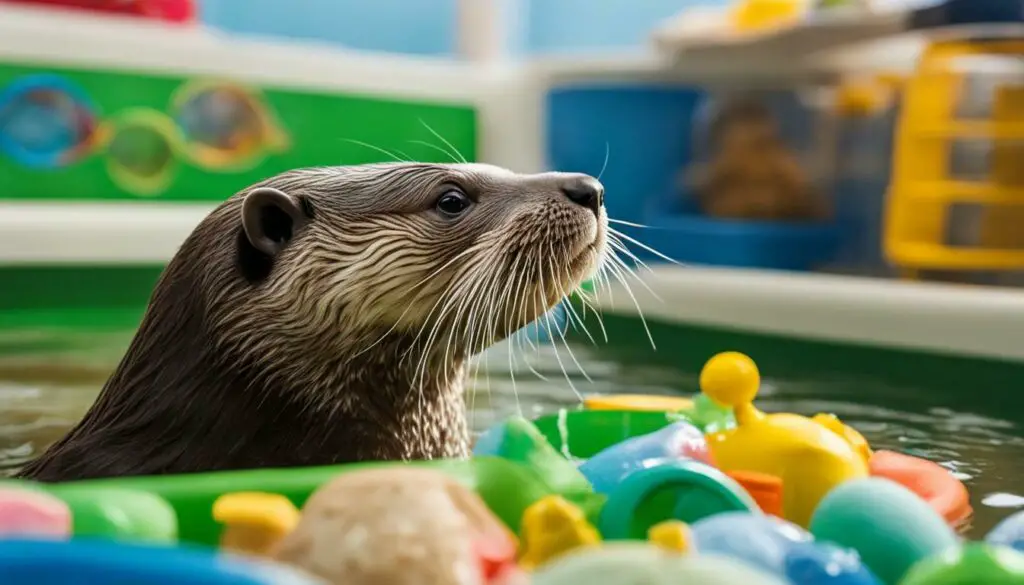
Legal Considerations for Keeping Otters as Pets
Before considering an otter as a pet, it is crucial to understand the legal implications and ethical concerns associated with their ownership. While otters are becoming increasingly popular as pets, it is important to note that their natural habitat is not the same as a domestic environment. In many countries, including the United States, keeping otters as pets can be illegal due to concerns about their welfare and the impact on wild otter populations. It is essential to research and comply with the laws and regulations of your specific location before even considering otter adoption.
The pet trade, especially for exotic animals like otters, can have detrimental effects on their conservation. The demand for pet otters can contribute to the decline of wild otter populations as poaching and illegal trade are often fueled by the desire to meet this demand. Supporting the illegal pet trade not only puts wild otters at risk but also contributes to the destruction of their natural habitats. It is crucial to consider the broader environmental impact before deciding to keep otters as pets.
| Country | Legality of Otter Ownership |
|---|---|
| United States | Varies by state; many states prohibit pet otters |
| Canada | Illegal without proper permits |
| United Kingdom | Illegal; otters are protected under the Wildlife and Countryside Act |
As responsible pet owners, it is essential to prioritize the well-being and conservation of otters. Instead of keeping otters as pets, consider alternative ways to experience and appreciate these fascinating creatures. Visit wildlife sanctuaries that provide a safe and natural environment for otters, participate in educational programs that promote conservation efforts, or support organizations working towards otter preservation. By taking these actions, we can ensure the welfare and conservation of otters while still enjoying and learning from their presence in the world.
Space and Enrichment Requirements
Otters require a significant amount of space and enrichment activities to ensure their physical and mental well-being when kept as pets. These playful creatures have a natural instinct to swim, explore, and engage in various activities. Providing them with a spacious enclosure that mimics their natural habitat is crucial for their overall health and happiness.
When it comes to space requirements, otters need a large area to move around freely. According to experts, a minimum of 400 to 600 square feet is recommended for a single otter. The enclosure should include both land and water areas, with a pool deep enough for swimming and diving. Additionally, otters are avid climbers and require structures such as rocks or logs to climb on.
Enrichment activities are essential to keep pet otters mentally stimulated and prevent boredom. This can include providing toys, puzzles, and objects for them to play with and investigate. A variety of items, such as balls, puzzles, and floating toys, can be introduced to encourage their natural instincts and ensure they have a fulfilling environment. Food puzzles or hiding treats within the enclosure can also provide mental stimulation while satisfying their foraging instincts.
| Space and Enrichment Requirements for Pet Otters |
|---|
| Space: A minimum of 400-600 square feet with land and water areas |
| Swimming Pool: Deep enough for swimming and diving |
| Climbing Structures: Rocks or logs for climbing and exploration |
| Enrichment: Toys, puzzles, and objects to stimulate their minds |
| Food Enrichment: Food puzzles and hiding treats for mental stimulation |
It is important to note that providing a suitable environment for pet otters is a significant commitment of both time and resources. Regular maintenance of the enclosure, including cleaning and providing fresh water, is necessary to ensure their well-being. Consulting with experts or professionals experienced in otter care can help you better understand their specific needs and provide them with the best possible living conditions.
“Enrichment activities are essential to keep otters mentally stimulated and prevent boredom.”
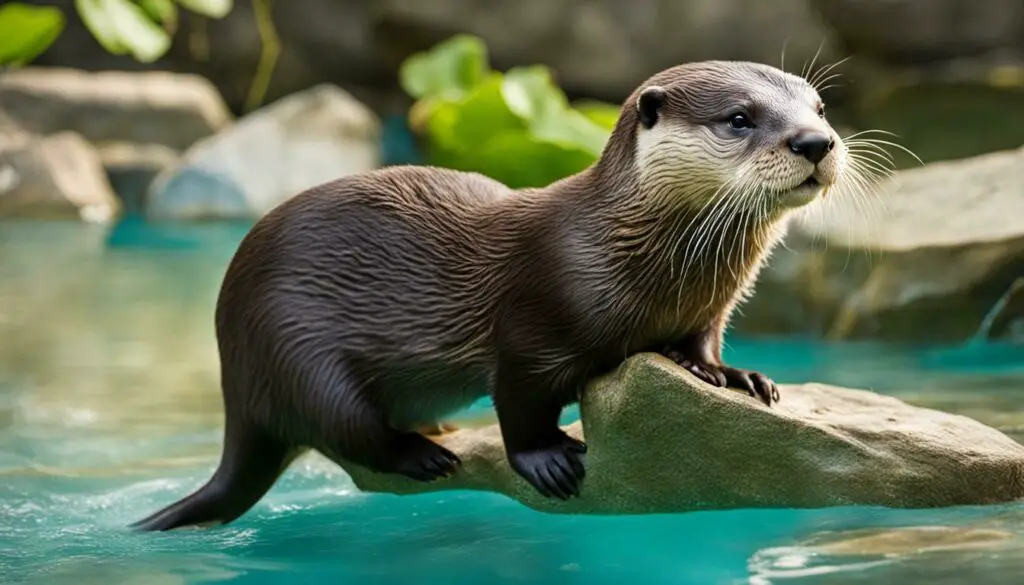
Aggression and Odor Concerns
It’s important to be aware of potential aggression and odor concerns when considering an otter as a pet. While otters may be cute and playful, they are still wild animals with natural instincts that can manifest in aggressive behavior. Otters have sharp teeth and claws, and although they may not intend to harm their owners, their playful nature can sometimes result in accidental scratches or bites. It is crucial to understand that these actions are not malicious, but rather a reflection of their wild nature.
Additionally, otters have a distinct and strong odor that can be challenging to manage in a domestic setting. Their scent glands produce a musky smell, which serves as a means of communication in the wild. This odor can permeate through the house and may be challenging to eliminate completely. It’s important to consider the impact this odor may have on your living environment and those who reside with you.
Therefore, if you are thinking about having an otter as a pet, it’s essential to evaluate whether you can handle the potential aggression and odor that come with it. Proper knowledge, training, and socialization can help minimize their aggressive tendencies, but it’s crucial to understand that these wild animals will always retain certain instincts. Additionally, managing the odor requires regular cleaning and maintaining a well-ventilated environment. By considering these factors, you can make an informed decision about whether otter ownership is suitable for you and your living situation.
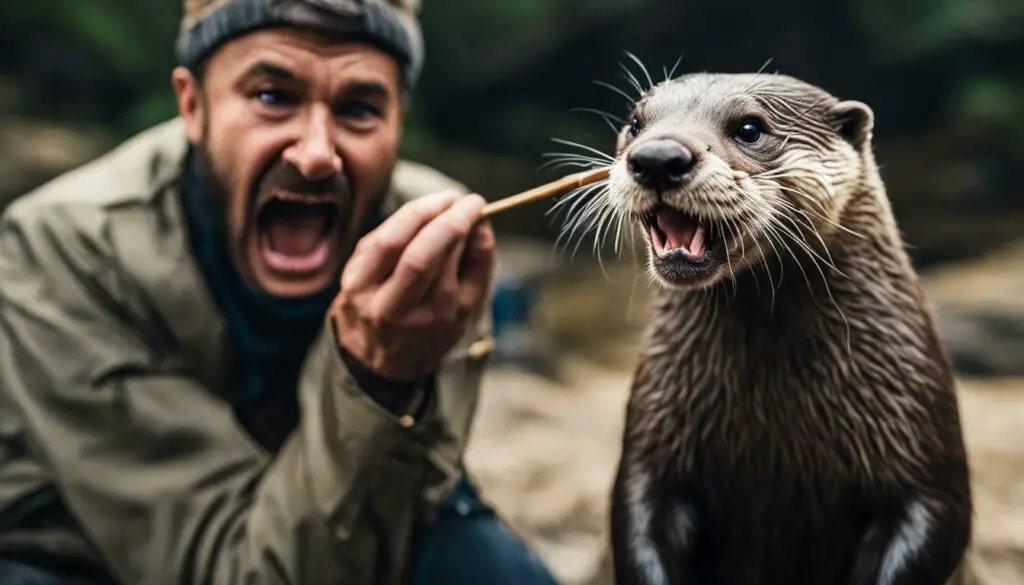
| Aggression and Odor Concerns | Considerations |
|---|---|
| Aggressive Behavior | Due to their wild nature, otters may display aggressive behavior, resulting in accidental scratches or bites. |
| Distinct Odor | Otters have a musky odor that can be challenging to manage in a domestic setting, requiring regular cleaning and ventilation. |
“Owning an otter comes with the responsibility of understanding and managing their natural instincts, including potential aggression and distinct odor.” – Otter Pet Enthusiast
Impact on Wild Otter Populations
Owning otters as pets can have significant implications for the conservation and well-being of wild otter populations. These charismatic creatures are highly sought after as pets, especially in certain parts of Asia. However, the growing demand for otters as pets has led to an increase in illegal trafficking and poaching, jeopardizing the survival of wild otter populations.
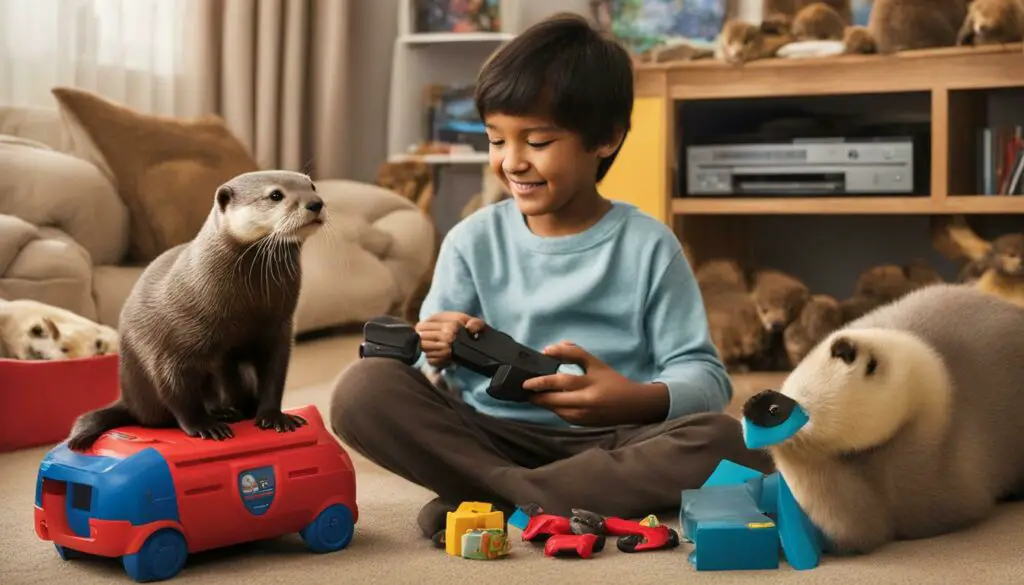
According to a report by the International Otter Survival Fund, the illegal pet trade has had devastating effects on otter populations worldwide. Many otters are taken from their natural habitats, disrupting their social structures and reducing their ability to reproduce. This, coupled with habitat loss and pollution, has led to a decline in wild otter populations in recent years.
It is crucial to understand that otters play a vital role in maintaining the balance of aquatic ecosystems. As top predators, they help control populations of prey species and contribute to the overall health and diversity of their habitats. Removing otters from their natural environments disrupts these delicate ecosystems and can have far-reaching consequences for other species.
| Reasons why otters are not suitable as pets: |
|---|
| 1. Otters have specific habitat and dietary requirements that are challenging to meet in a domestic setting. |
| 2. They are difficult to house-train and are prone to infections due to their specialized needs. |
| 3. Otters need ample space and mental stimulation to thrive, making it challenging to provide them with a suitable environment in a typical household. |
| 4. Keeping otters as pets can be illegal in many countries, and supporting the pet trade only perpetuates the decline of wild otter populations. |
| 5. Otters can be aggressive, emit a strong odor, and create a mess in the house, which may not be conducive to a harmonious living environment. |
The International Otter Survival Fund warns:
“Owning an otter as a pet may provide temporary entertainment, but the long-term consequences for otters in the wild are dire. It is essential to respect these incredible animals and their natural habitats by supporting conservation efforts and promoting responsible pet ownership.”
By raising awareness about the negative impact of the pet trade and encouraging responsible actions, we can help safeguard the future of otter populations and ensure the preservation of their fragile ecosystems. It is crucial to prioritize the well-being of wild otters over our desire for novelty pets.
The Role of Otters in Aquatic Ecosystems
Otters play a vital role in preserving the health and balance of aquatic ecosystems. As apex predators, they help regulate populations of prey species, leading to a more diverse and stable ecosystem. By feeding on various aquatic organisms such as fish, crustaceans, and mollusks, otters help to control their populations and prevent overgrazing of vegetation.
Furthermore, otters’ foraging habits contribute to the redistribution of nutrients within aquatic systems. As they hunt and consume their prey, they may drag their catch onto land or eat them partially submerged, resulting in the dispersal of organic matter back into the water. This process provides essential nutrients that support the growth of algae and other primary producers, forming the foundation of the food web.
Additionally, otters’ activities, such as digging burrows and creating dams, have a profound impact on the physical structure of aquatic habitats. These alterations help create a diverse mosaic of habitats, including pools, riffles, and deep channels, which are crucial for the survival of numerous species. The interconnected network of these habitats enhances the overall productivity and resilience of the ecosystem.
| Key Ecological Role of Otters | Benefits to Aquatic Ecosystems |
|---|---|
| Predator Control | Regulates prey populations and prevents overconsumption |
| Nutrient Redistribution | Disperses organic matter, supporting the growth of primary producers |
| Habitat Modification | Creates diverse habitats, enhancing ecosystem productivity |
“The presence of otters in a healthy aquatic ecosystem is indicative of its overall ecological integrity.”
It is clear that otters play a crucial role in maintaining the ecological balance of aquatic ecosystems. Their absence or decline can have far-reaching consequences, affecting the entire food chain and leading to negative cascading effects on other species. Thus, it is essential to protect otters and their habitats to ensure the continued health and functioning of our waterways.
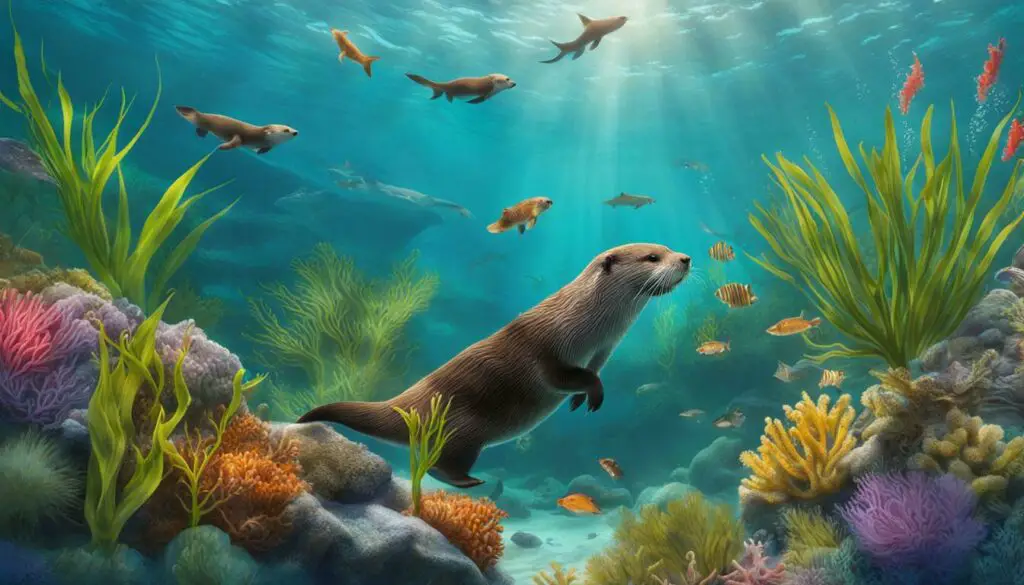
Exploring Alternative Ways to Experience Otters
If you’re captivated by otters but understand the challenges of keeping them as pets, there are other ways to experience and appreciate these fascinating creatures. Visiting otter sanctuaries and zoos is a great way to observe otters up close while supporting their conservation efforts. Many of these facilities provide educational programs and interactive experiences that allow you to learn about otters and their natural behaviors.
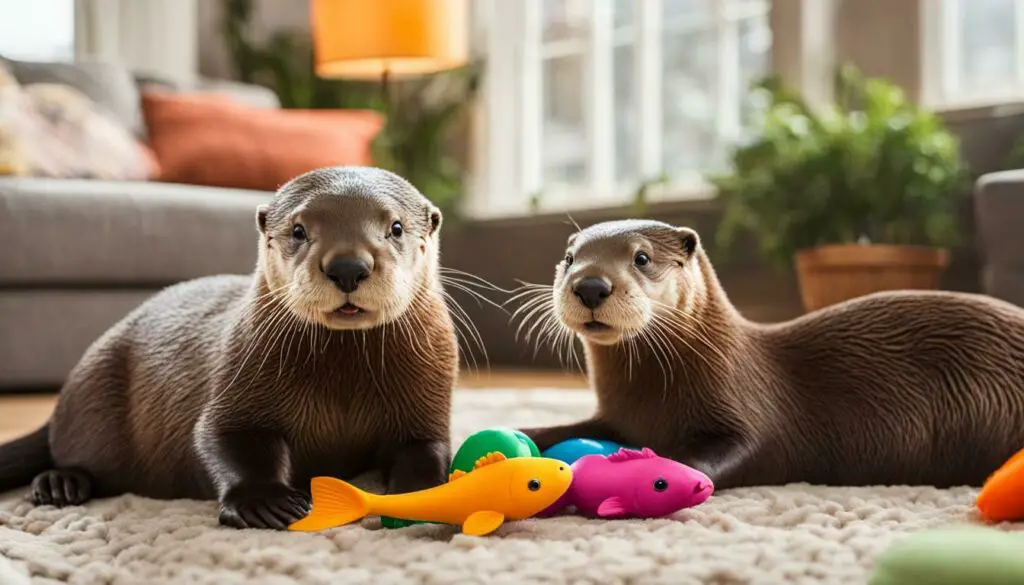
Another option is to volunteer at wildlife rehabilitation centers or organizations that work with otters. This hands-on involvement allows you to contribute to the care and rehabilitation of otters while gaining valuable knowledge about their behavior and needs.
For those who prefer a more immersive experience, consider participating in guided tours or boat trips that focus on otter observation in their natural habitats. These excursions provide the opportunity to see otters in their element, engaging in their daily activities and interactions.
By exploring these alternative ways to experience otters, you can satisfy your curiosity and love for these playful creatures while ensuring their well-being and conservation. Remember, it is our responsibility to respect and protect their natural habitats, allowing otters to thrive in the wild where they truly belong.
Responsible Pet Ownership and Ethical Considerations
Responsible ownership of otters, as with any exotic pet, requires careful consideration of the ethical implications and a commitment to providing the best possible care. While otters may seem adorable and appealing as pets, it is important to understand that they are wild animals with specific needs and behaviors that are difficult to replicate in a domestic setting.
Table:
| Challenges | Considerations |
|---|---|
| Specific habitat and dietary requirements | Creating an appropriate environment and providing a nutritionally balanced diet can be challenging and expensive. |
| Legal restrictions | Keeping otters as pets can be illegal in many countries and regions, contributing to the decline of wild otter populations. |
| Aggression and odor concerns | Otters can be aggressive and emit a strong odor, which can be difficult to manage in a domestic setting. |
Furthermore, otters are highly social creatures that require ample space and mental stimulation to thrive. Keeping them confined to a small enclosure or depriving them of social interaction can lead to stress and behavioral issues.
“Responsible pet ownership means respecting the natural habitats of wild animals and considering their well-being above our desire for novelty,” says Dr. Jane Thompson, a wildlife conservationist. “Instead of keeping otters as pets, we encourage people to visit sanctuaries, participate in educational programs, or support conservation efforts to help protect these incredible animals.”
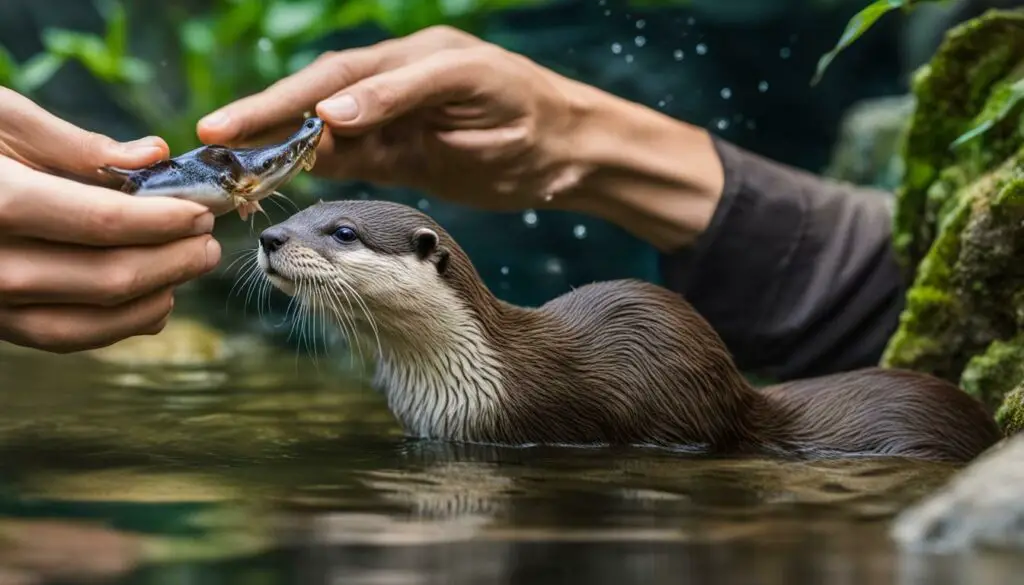
By promoting responsible pet ownership and advocating for the preservation of otter species, we can ensure that these fascinating creatures continue to play their vital role in maintaining the balance of aquatic ecosystems. Let’s appreciate otters in their natural habitats and support efforts to conserve their populations for generations to come.
Conclusion
While the idea of having an otter as a pet may be enticing, it’s essential to understand that these captivating creatures thrive best in their natural habitats and are not suitable for domestication. Otters are wild animals with specific habitat and dietary requirements that are challenging to meet in a domestic setting.
One of the main reasons why otters are not suitable as pets is their wild nature. They have specialized needs that are difficult to fulfill, such as providing them with access to water for swimming and hunting. Additionally, otters have a carnivorous diet that requires careful consideration and expertise to meet their nutritional needs.
House-training otters is also a significant challenge. They are not easily housebroken, which can lead to sanitary issues and damage to the household. Furthermore, otters are susceptible to infections, making their care and well-being even more demanding.
Moreover, otters are highly social animals that require ample space and enrichment to thrive. Keeping them confined in a home environment cannot provide the necessary stimulation and social interaction they need, which can lead to behavioral and health problems.
In many countries, keeping otters as pets can be illegal due to the impact it has on wild otter populations. The pet trade can contribute to the decline of these majestic creatures in their natural habitats. Additionally, otters can be aggressive, emit a strong odor, and create a mess in the house, which can be overwhelming for most owners.
It’s important to remember that otters play a vital role in maintaining the balance of aquatic ecosystems. They are keystone species that help regulate populations of prey species and control vegetation growth. By keeping otters in their natural habitats, we can support the overall health and well-being of our ecosystems.
In conclusion, while otters may appear cute and entertaining, they are not suitable as pets and should be left in their natural habitats. Instead of trying to keep otters as pets, we can appreciate and interact with these amazing creatures through visiting sanctuaries, participating in educational programs, or supporting conservation efforts. Let’s respect otters and their natural habitats, ensuring their continued existence for generations to come.
FAQ
Are otters suitable as pets?
No, otters are not suitable as pets due to their wild nature, specific habitat and dietary needs, and other challenges associated with their care.
What are the specific habitat and dietary requirements of otters?
Otters require access to water and a suitable enclosure that mimics their natural habitat. They also have a carnivorous diet that needs to be carefully managed.
Can otters be house-trained?
No, otters are difficult to house-train and may create a mess in the house.
Are otters prone to infections?
Yes, otters are susceptible to infections and require proper veterinary care.
Do otters require a lot of space and enrichment?
Yes, otters are highly social animals and require ample space and mental stimulation to thrive as pets.
Is keeping otters as pets legal?
Keeping otters as pets can be illegal in many countries, including the United States.
Can otters be aggressive?
Yes, otters can exhibit aggression, especially when they feel threatened or stressed.
Do otters emit a strong odor?
Yes, otters emit a strong odor, which can be a challenge to manage in a domestic setting.
What is the impact of keeping otters as pets on wild otter populations?
Keeping otters as pets can contribute to the decline of wild otter populations due to the pet trade and the removal of otters from their natural habitats.
What is the role of otters in aquatic ecosystems?
Otters play a crucial role in maintaining the balance of aquatic ecosystems as keystone species.
Are there alternative ways to experience otters?
Yes, you can visit sanctuaries, participate in educational programs, or support conservation efforts to enjoy otters in a responsible and ethical manner.
What are the ethical considerations of keeping otters as pets?
Keeping wild animals like otters as pets raises ethical concerns regarding their well-being in captivity and the importance of respecting their natural habitats.

